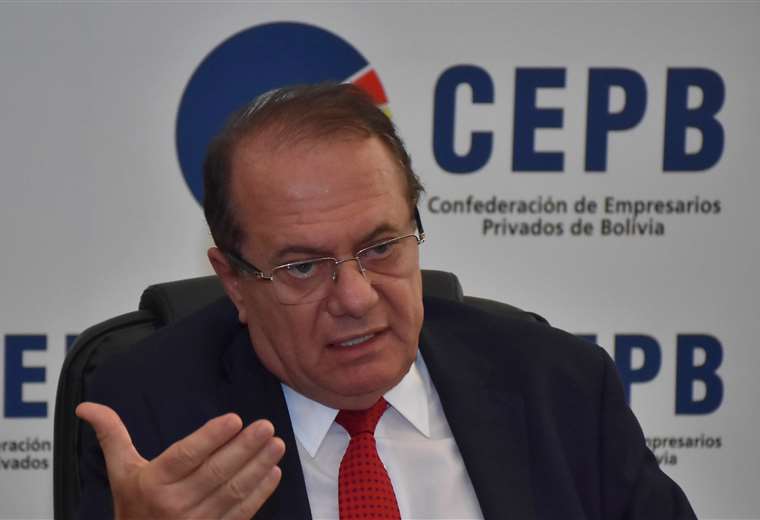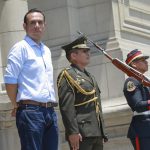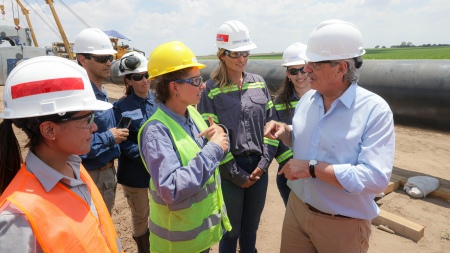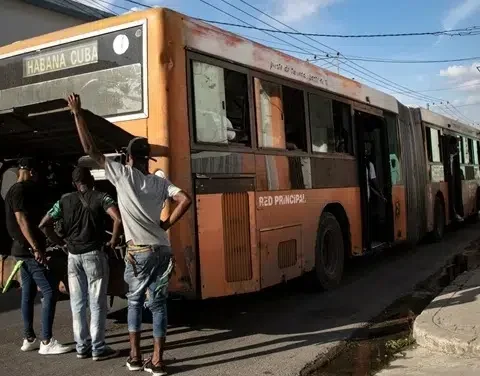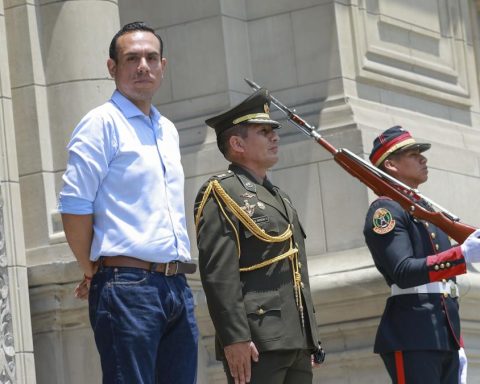January 29, 2023, 8:00 AM
January 29, 2023, 8:00 AM
The head of the Bolivian Business Confederation (CEPB), Luis Fernando Barbery, He believes that the country will not be able to develop its potential or achieve sustained growth if there is no effective work between the business sector and the State.
What is the current state of the country’s business sector economy?
We are in a process of slow, uneven recovery and in adverse conditions. The health and political crises have had structural effects on employment, entrepreneurship and investment. The serious problems of smuggling, informality, inequalities in the reactivation by sectors and regions, tax, labor and salary pressure, the regressive policy of agricultural exports, the effects on the security of companies and the absence of investment policies persist.
Despite everything, agribusiness, private mining and exporters have been more dynamic which, added to the high demand and the increase in international prices, have been able to sustain the national economy and avoid a major crisis.
How do you evaluate the economic management of the administration of President Luis Arce?
Our country was favored by the high international prices of the raw materials we export, including gas, in addition to remittances and the increase in tax collection from the private sector. However, the uncertainty due to the absence of a long-term economic policy, the centralist vision and the decision not to coordinate with the private sector, have charged costs in sustaining the fiscal deficit, the fall in Net International Reserves (NIR) and the dependence of our economy on the international market.
Some government behaviors have been detrimental, such as the suspension of food exports for political reasons, the slowness in resolving conflicts, the stubbornness in banning biotechnology, the permissiveness of subjugation, and the prioritization of politics over the economy. This has prevented us from obtaining greater benefits from the global situation, but, above all, it may limit the possibilities of taking better advantage of it in the immediate future.
On a global scale, there is a favorable scenario for commodity prices. What actions are urgently needed to fully exploit this situation?
You have to see both sides of the medal. While it is true that there is a great opportunity for the economy due to the increased demand for food, minerals and energy that Bolivia produces, we must also consider that there is a great risk of a global economic recession that will generate high levels of inflation, shortages and higher unemployment. Both things will affect us and we must prepare to face them. The great challenge is for the Government, which must put the country’s economic objectives before ideological visions.
If you continue with the idea that the State alone is going to face the crisis and guarantee development, the risks are greater. Already in 2022 it became clear that, without the effort, contribution and installed capacity of the private sector, the economy would have collapsed. From this perspective, it is urgent and necessary to create the conditions to increase production, protect the national industry, increase private investment, guarantee private property and reduce conflict. These are not proposals but needs, whose fulfillment depends simultaneously on facing the effects of the recession and taking advantage of the opportunities of the international environment.
On the normative and regulatory issue, how many opportunities does Bolivia miss out on due to the lack of freedom to export its production surpluses?
Production capacity is being wasted, rather than surplus export. With biotechnology, legal certainty for investments, public-private agreements, an end to salary and tax overregulation and control of subjugation, the installed capacity of the industry and the available resources, could generate in a short time a true unprecedented productive revolution because the international demand will continue and possibly increase, as well as transport facilities, trade and credit flows to the region. Regarding regulations, it is the lack of State policies that causes the promulgation of unconnected, dispersed, contradictory and regressive norms, created by pressure, interests or ignorance, which are not complied with and which, instead of helping development, harm .
The Government plans to guarantee the stability of the economy based on internal production. How can this goal be achieved if a ‘divorce’ of the state apparatus with the country’s business sector is becoming more and more notorious every day?
We have always maintained that the solution is to increase agricultural production, add value to the exploitation of minerals and energy, and develop the country’s potential in tourism, the orange industry, and services. On the issue of production, we agree with the government’s objective, but we differ on the method.
As long as that vision persists and there is no coordinated and articulated work between the private sector and the State, the economy will continue to be dependent on what happens in world markets, we will continue to be invaded by smuggling and measuring the success of policies by macroeconomic and not for the welfare, safety and stability of the people.
In the internal economic environment, the decrease in NIRs is of concern. From the business side, what do you think are the risks and consequences if the downward trend persists and what actions should be applied to boost reserves?
The RIN are the result of trade between countries and a key indicator to maintain the exchange rate stability of the dollar with respect to the local currency. The level of reserves influences confidence and certainty for international trade, specifically for imports.
The accumulation of NIRs increases the financial solidity of the country, by making possible better cost and term conditions for external financing, in addition to being an important requirement for the stability of the system.
In the business field, the variation in the price of the dollar -has to do with the RIN-, if it is maintained in reasonable ranges as it occurs in most neighboring countries, it is beneficial for exports or imports. The maintenance and growth of the RIN originates, above all, in exports, external credit and donations. The revitalization and increase of exports is the possible, necessary and appropriate way to prevent the fall in NIR from becoming a serious crisis.
Low inflation, with a strong currency in the region, how does it affect the business world?
The fact that in the country we have an appreciated exchange rate means that it is cheaper to import formally and that contraband is also cheaper than similar goods that are produced in the country. An appreciated currency additionally penalizes exports since fewer bolivianos are received for every dollar exported. Regarding inflation, we consider that it is low because several products that the population acquires are foreign and that certain national products or inputs have a subsidy with a high cost for the State. To the extent that people prefer foreign products to national products, installed capacities in the country are underutilized and therefore growth in sectors and regions, as well as formal employment, are limited.
National Customs reports gigantic operations and seizures, does the sector notice a reduction in smuggling?
We value the effort shown by the Vice Ministry for the Fight Against Smuggling and Customs. However, as long as there is no comprehensive policy that includes a fight against the entry, sale and consumption of contraband products, this crime will continue and there will be no way to stop it. Smuggling has increased significantly despite the pandemic and was sustained by inflation in neighboring countries, especially Peru, Chile and Argentina, although we believe that there was a decrease in the entry of Asian products during the container crisis.
Uncertainty, price volatility and recession risks reflect the global economic outlook this year. The Government assures that the Bolivian economic model is prepared to withstand these external shocks. What is the reading on the matter?
No model that focuses on the State as the sole actor and protagonist of a country’s economy has a chance of success, especially in such a complex scenario and dependent on external factors that can change very quickly. The combination of effective decisions, unexpected situations and the commitment of the private sector have managed to keep us relatively out of crises, but the danger has not passed and we can still be reached by the problems that now afflict neighboring countries.
The Government foresees a GDP growth of 4.86% this year, an inflation rate of 3.28%, a deficit of the non-financial public sector of 7.49% and a public investment of $us 4,006 million, do you see achievable the goals?
We will always hope that Bolivia reaches the highest and most positive indicators and we will work to achieve that objective; however, we believe that there are conditions that must be met and that requires a change in the orientation of policies and attitude. In 2022, the growth forecast was 5.1% and we have reached 4%.
In 2023, the situation may become more complex. The promulgation of norms, the dispersed plans and the creation of more public companies are not solutions or fundamental strategies, they are measures of relative effect and high cost that distract from the real problems.
Entrepreneurs are always ready to advance in the opening of coordination spaces because we believe that the country cannot develop its potential or achieve sustained growth, if there is no effective work between the private sector and the State.
